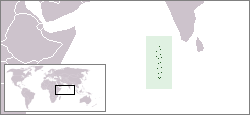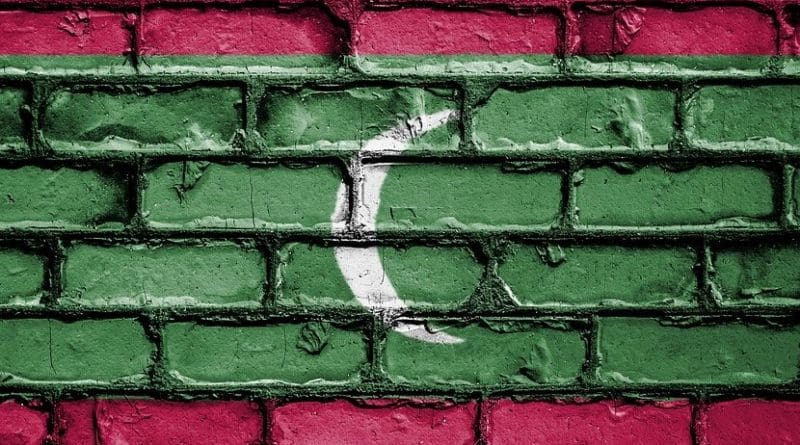Maldives And GMR: Small Fish In A Big Pond – Analysis
Maldives set a storm in the Indian Ocean so to say by defying Indian government’s call and terminating a crucial long term agreement that granted airport rights to an Indian infrastructure giant GMR. The decision was seen as a major setback to India Maldives relations particularly as media reports indicated that India’s newly appointed External Affairs Minister Mr. Salman Khursheed was working the telephone lines to Male to avoid a standoff on the issue.
Some see these developments as increasing competition for stakes in the big pond of the Indian Ocean between India, China and the US with Pakistan and Saudi Arabia in a supporting role. Full manifestations of the competition are however yet to unravel. Maldives and GMR could therefore be the small fish in this power struggle which has an internal dynamics with political feud in Maldives intensifying over the past few months after transition of power under abnormal circumstances on 7 February 2012.

The trigger to the current crisis was set off by a press release of the President of Maldives office on 27 November which stated that the Concession Agreement, signed on 28th June 2010 between GMR-MAHB Consortium, Maldives Airports Company Ltd, and Government of Maldives, to lease Male’ International Airport to GMR was terminated. The release indicated that the decision was based on, “technical, fiscal and economic issues”, examined by a cabinet committee, various ministries and also legal advice of UK and Singapore lawyers. The advice by UK lawyers is relevant given that the agreement has been signed under UK laws.
Significantly the agreement has been rendered void implying that it was never valid as such putting pressure on GMR to vacate airport within a week without the mandatory notice period of three months and ignoring arbitration proceedings in Singapore for the 25 year lease. State-owned Maldives Airports Company Limited (MACL) is therefore set to take over the airport on or before the expiry of the seven days period.
The GMR management however seemed defiant, “We have no plans to go. We have 23 more years here,” GMR’s Head of Corporate Communications Arun Bhaghat was quoted by Minivan News. The attractiveness of the project for GMR is evident with company reportedly earning Rs 440 million profit in the September quarter from the Male airport as per Money Control while it has yet to make good on investments in Delhi which is a much larger project. There could thus be an ugly legal battle ahead spread in courts from Male to Singapore which may go on for months.
Responding to these developments, India’s Ministry of External Affairs in a Press release indicated that the decision of the Maldives government to terminate the agreement with the GMR Group send a negative signal to foreign investors and international community given that the consortium was awarded the contract through a global tender conducted by the International Finance Corporation (IFC), Washington, a member of the World Bank. In a sign seeking reassurance, the statement added, “We call upon the Government of Maldives and all concerned parties to ensure that Indian interests in Maldives and the security of Indian nationals are fully protected”.
The sensitivity of the decision in political context of Maldives is evident with comments of various leaders. Former President Mohamed Nasheed in whose term the agreement was signed stated, “Waheed’s government has cynically used xenophobia, nationalism and religious extremism to attack GMR, the country’s largest foreign investor. Waheed is leading the Maldives down the path to economic ruin.” The nationalist sentiment is evident with photograph of a petition signed on behalf of a group which calls itself, “Maldivians’ Airport for Maldivians,” prominently displayed on the web site of the President.
The Progressive Party of the Maldives (PPM) led by former President Maumoon Abdul Gayoom welcomed the decision but was also cautious on India Maldives relations stating, “It is PPM’s hope that the government’s decision to terminate the agreement with GMR will not affect the historic friendship between the governments and people of the Maldives and India.”
The Dhivehi Qaumee Party (DQP) which reportedly had moved the Civil Court against airport development charge (ADC) by GMR was jubilant while the largest party in the ruling coalition, the Dhivehi Rayyithunge Party (DRP), was more reserved, “The government should act responsibly and according to the legal contract,” said DRP MP Dr Abdulla Mausoom.
The Adhaalath Party seen as a non secular political formulation has been at the forefront of the agitation against the GMR which has raised concerns on rising fundamentalism. Special envoy of former President Mohamed Nasheed in a visit to India had stated, “The attack on GMR contract is an Islamic fundamentalist issue.” Zaki raised uproar back home when he called for intervention by Indian troops. “If we were in the Government, definitely we would have done it by now? definitely (asked for) their (Indian forces) to be on the ground,” Zaki was reported by the Indian media which recalled that he was the person who had telephoned then Indian Prime Minister Rajiv Gandhi in 1988 when President Gayoom’s government faced a coup.
On the whole it appears that India’s Maldives policy may be under stress to say the least. Forebodings of a crisis on the GMR issue were more than evident as anti India sentiment were building up for some time in Male. Most notably spokesperson of the President’s Office Abbas Adil Riza commented on the role of the Indian Ambassador adversely though the Government was quick to disassociate itself. The Indian Ministry of External Affairs had also expressed concern over anti India demonstrations in the country in a Press Release on 16 November and stated that “A senior official of the Government of India visited Maldives recently and conveyed our concerns in regard to recent developments in the country”.
That despite these developments the Maldives government has continued with the process of termination of contract with the GMR indicates that it is willing to confront India. This can come about only if it feels it is on a strong wicket particularly so as the government is due to receive a $ 25 million bail out to pay salaries of its employees in January from New Delhi.
Ironically defence ties between India and Maldives have expanded considerably. Even as the GMR crisis was building up the fourth Joint Military Training Exercises between the Indian Army and the Maldives National Defence Force (MNDF) – EKUVERIN 2012 – were being held in Belgaum, India from 12-25 November 2012. India’s Defence Minister Mr. A.K. Antony and the Home Minister Mr. S K Shinde were in Maldives in September 2012 and had worked out extensive security cooperation programme including infrastructure and training with the Maldives defence forces. How this will progress now remains to be seen?
The GMR case can also be seen as the beginnings of competition at the edge of the Indian Ocean given significance of Maldives a small country of less than 400,000 people and 80,000 migrant workers astride sea lines of communications from energy rich West Asia to South East and East Asia.
There are obvious interests of China which is also investing heavily in mineral exploration of the Indian Ocean. China has expanded influence through tourism with 25 percent of inflow in 2012 so far from that country. Maldives President Waheed was also assured of assistance during his visit to China-Eurasia Expo and China-Eurasia Economy Development and Cooperation Forum in September this year. Saudi Arabian support to Wahabbism in Maldives and Pakistan’s increasing influence through locals who have been educated in that country has been cited as reasons for growth of fundamentalist trends and anti Indianism respectively.
Maldives will however have to contend with the reality of geography as Indian Union Territory of Lakshadweep is separated by Eight Degree Channel from Maldives and the northern-most island of Maldives is just 128 km from Minicoy. Prudence may be to continue the deep engagement that has been traditionally ongoing with India while attempting to benefit from largesse by other players, but the degree of sophistication required to achieve this balance is lacking with the present generation of Maldives leadership. Thus short term contretemps are likely to continue.

